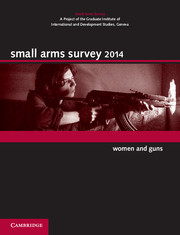Book contents
- Frontmatter
- Foreword
- Contents
- About the Small Arms Survey
- Notes to readers
- Acknowledgements
- Introduction
- Chapter 1 In War and Peace: Violence against Women and Girls
- Chapter 2 Converging Agendas: Women, Peace, Security, and Small Arms
- Special Feature. Women behind the Gun: Aiming for Equality and Recognition
- Chapter 3 Breaking New Ground?: The Arms Trade Treaty
- Chapter 4 Trade Update: Transfers, Retransfers, and the ATT
- Chapter 5 Countdown to Catastrophe: The Mpila Ammunition Depot Explosions
- Chapter 6 Across Conflict zones: Ammunition Profiling
- Chapter 7 Signs of Supply: Weapons Tracing in Sudan and South Sudan
- Chapter 8 On the Record: Illicit Weapons in the the United States
- Index
Chapter 5 - Countdown to Catastrophe: The Mpila Ammunition Depot Explosions
Published online by Cambridge University Press: 05 July 2014
- Frontmatter
- Foreword
- Contents
- About the Small Arms Survey
- Notes to readers
- Acknowledgements
- Introduction
- Chapter 1 In War and Peace: Violence against Women and Girls
- Chapter 2 Converging Agendas: Women, Peace, Security, and Small Arms
- Special Feature. Women behind the Gun: Aiming for Equality and Recognition
- Chapter 3 Breaking New Ground?: The Arms Trade Treaty
- Chapter 4 Trade Update: Transfers, Retransfers, and the ATT
- Chapter 5 Countdown to Catastrophe: The Mpila Ammunition Depot Explosions
- Chapter 6 Across Conflict zones: Ammunition Profiling
- Chapter 7 Signs of Supply: Weapons Tracing in Sudan and South Sudan
- Chapter 8 On the Record: Illicit Weapons in the the United States
- Index
Summary
INTRODUCTION
On 4 March 2012, a series of explosions destroyed several military barracks in the Mpila area of Brazzaville, Republic of the Congo (RoC). The blasts devastated two surrounding, densely populated districts of the capital, claiming hundreds of lives, injuring thousands, and displacing well over 100,000 people.
The international community swiftly contributed significant emergency funding and coordinated explosive ordnance disposal (EOD) and humanitarian relief activities with non-governmental organizations (NGOs). The magnitude of the event—particularly its immediate consequences—drew considerable media coverage as well as efforts to tackle the underlying problem of poor stockpile management. Since then, however, national priorities and international donor funding have moved on. The root causes of the explosions have still not been properly addressed, nor have their broad socio-economic consequences been fully remedied.
In January 2013 the Small Arms Survey participated in an evaluation funded by the European Union (EU) and led by the Geneva International Centre for Humanitarian Demining (GICHD). The assessment focused on (i) the effectiveness of the clearance activities, (ii) the coordination between the national authorities and the implementation partners, and (iii) the risk education provided to communities around Mpila concerning the potential danger of unexploded ordnance (UXO). The evaluation team travelled to Brazzaville from 14 to 23 January 2013 and published its report in March 2013 (EU, 2013).
- Type
- Chapter
- Information
- Small Arms Survey 2014Women and Guns, pp. 144 - 177Publisher: Cambridge University PressPrint publication year: 2014



